
A shoe is an item of footwear intended to protect and comfort the human foot. Though the human foot can adapt to varied terrains and climate conditions, it is vulnerable, and shoes provide protection. Form was originally tied to function, but over time, shoes also became fashion items. Some shoes are worn as safety equipment, such as steel-toe boots, which are required footwear at industrial worksites.

Footwear refers to garments worn on the feet, which typically serve the purpose of protection against adversities of the environment such as wear from rough ground; stability on slippery ground; and temperature.

A Wellington boot, often shortened to welly, and also known as a gumboot, rubber boot, or rain boot, is a type of waterproof boot made of rubber.
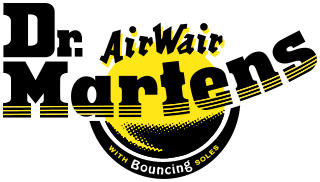
Dr. Martens also known as Doc Martens, Docs, or DMs, is a footwear and clothing brand, headquartered in Wollaston, Northamptonshire. Although famous for its footwear, the company also makes a range of accessories including clothing and bags. The footwear is distinguished by its air-cushioned sole, upper shape, welted construction, and yellow stitching. The Dr. Martens' design studio is in Camden Town, London, England. The company manufactures in the UK, China, Vietnam, Laos, and Thailand. The company is listed on the London Stock Exchange and is a constituent of the FTSE 250 Index.
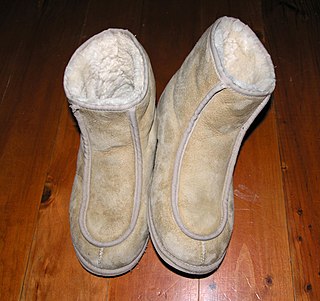
Ugg boots are a unisex style of sheepskin boot originating in Australia. The boots are typically made of twin-faced sheepskin with fleece on the inside, a tanned outer surface and a synthetic sole. The term "ugg boots" originated in Australia, initially for utilitarian footwear worn for warmth, and which were often worn by surfers during the 1960s. In the 1970s, the boots were introduced to the surf culture of the United Kingdom and the United States. Sheepskin boots became a fashion trend in the U.S. in the late 1990s and a worldwide trend in the mid-2000s. In Australia, they are worn predominantly as slippers and often associated with daggy fashion sense and bogan culture.
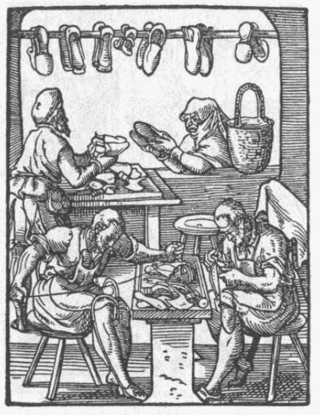
Shoemaking is the process of making footwear.
Driza-Bone, originating from the phrase "dry as a bone", is a trade name for the company making full-length waterproof riding coats and apparel. The company was established in 1898 and is currently Australian owned and manufactures its products in Australia. The trademark of Driza-Bone was first registered in 1933.

Combat or tactical boots are military boots designed to be worn by soldiers during combat or combat training, as opposed to during parades and other ceremonial duties. Modern combat boots are designed to provide a combination of grip, ankle stability, and foot protection suitable for a rugged environment. They are traditionally made of hardened and sometimes waterproofed leather. Today, many combat boots incorporate technologies originating in civilian hiking boots, such as Gore-Tex nylon side panels, which improve ventilation and comfort. They are also often specialized for certain climates and conditions, such as jungle boots, desert boots, and cold weather boots as well as specific uses, such as tanker boots and jump boots.
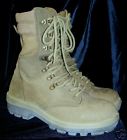
Jungle boots are a type of combat boot designed for use in jungle warfare or in hot, wet, and humid environments where a standard leather combat boot would be uncomfortable or unsuitable to wear. Jungle boots have vent holes in the arches and sometimes a canvas upper to aid in ventilation and drainage of moisture.

An Australian work boot is a style of work shoe, typically constructed with a leather upper bound together with elastic sides and pull tabs on the front and back of the boot. The shoe lacks a tongue, and laces, and often contains a steel toe cap for occupational health and safety reasons. When the shoe contains a steel cap they are often known as "safety boots" or "steel toe boots". The boots generally lack an inner lining. The sole is generally polyurethane and the leather uppers are treated to be resistant to hot water, fats and mild alkaline and acid solutions.
Veldskoene ("FELT-skoona") or colloquially vellies ("FELL-ys") are South African walking shoes made from vegetable-tanned leather or soft rawhide uppers attached to a leather footbed and rubber sole by a method known as stitchdown construction, done without tacks or nails.

Ammunition boots are a form of military footwear. They were the standard combat boot for the British Army and other forces around the British Empire and Commonwealth from at least the mid-1860s until their replacement a century later in the 1960s with the rubber-soled Boots DMS.

Solovair is a brand of British-made boots and footwear, produced by NPS Shoes Ltd., which was established in 1881. The NPS factory is based in Wollaston, Northamptonshire, an area known for its shoe industry. NPS shoes are known for their Goodyear welt technology which is used in all their shoe production. This particular technique is needed to fix the Solovair sole onto "Soft Sole Suspension" boots and shoes.
Tredair is a brand of British-made footwear first produced by White & Co., a shoe factory and then a shoe design and procurement business in Northamptonshire.

Manufacturing in Australia peaked in the 1960s at 25% of the country's gross domestic product, and has since dropped below 10%. At one stage manufacturing employed almost a third of Australia's workforce. Automotive manufacturing in Australia began in the 1920s and came to an end in 2017.
Helm Boots is a brand of boots in the U.S. The company was founded in 2009 by Joshua Bingaman, an Oklahoma native. The company's boots were manufactured in Turkey before production was relocated to Maine. The boots are designed in Austin and then manufactured in Maine using leather materials from American companies like Horween Leather Company and S. B. Foot Tanning Company.

Redback Boots is an Australian footwear manufacturing company, owned by the Cloros family. It specializes in lightweight work boots, and has been a supplier of the Australian Army, with its "Terra" boot at times being standard issue.
S. Kidman & Co is an Australian producer of beef. While it used to be one of the largest producers, since being owned by Gina Rinehart's Hancock Prospecting since December 2016, it has been selling off its properties. As of 10 April 2023 it has four pastoral leases, one in the Northern Territory and three in Queensland.
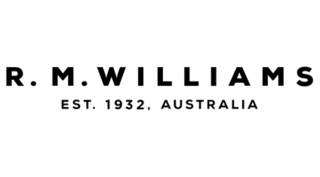
R.M. Williams is an Australian footwear and clothing company. It is best known for producing chelsea boots for men and women. The company was founded by Reginald Murray "R.M." Williams. It is currently owned by Tattarang, an investment company owned by mining magnate Andrew Forrest.
Oliver Footwear is an Australian footwear manufacturing company, but their boots are made off shore. Oliver specialises in lightweight work boots. Oliver Work Boots originated in Ballarat Vic Australia in 1887 originally supplying boots for gold miners in the area.












